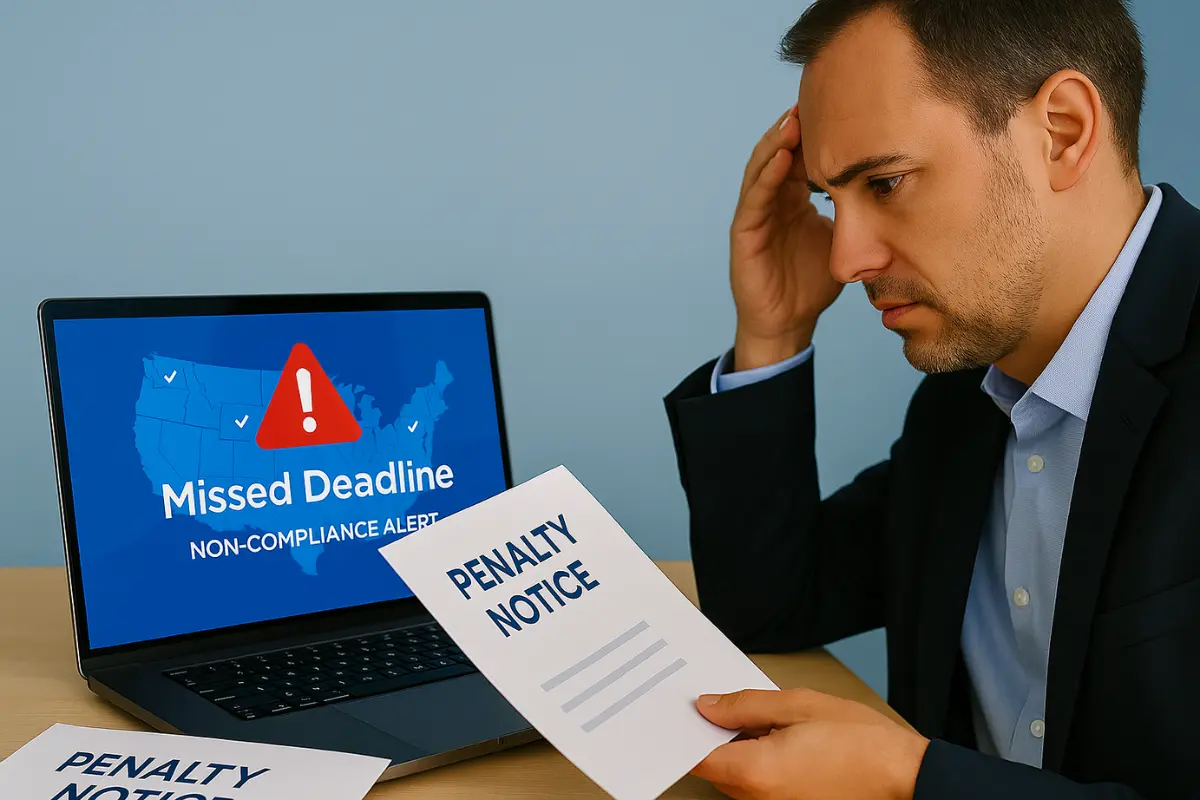Can I Be My Own Registered Agent for My Business?

When you start an LLC or corporation, one of the required steps is designating a registered agent, someone authorized to receive legal and government documents on behalf of your business. Many states allow business owners to serve as their own registered agent. This can seem like a simple way to save money and maintain control. After all, on the surface, it appears like all you have to do is receive mail related to your business.
However, choosing to act as your own registered agent carries important trade-offs. It can create privacy concerns since your personal address becomes part of the public record. Serving as your own agent also increases the risk of missing critical deadlines and legal notices, such as state compliance filings or even lawsuits, which can lead to costly penalties or default judgments against your business. These risks often outweigh the savings on professional registered agent fees.
In this article, you'll learn the legal requirements for registered agents, the potential challenges of serving as your own registered agent and when choosing a commercial service may provide better protection and peace of mind for your business.

What Is a Registered Agent?
A registered agent is your business's official point of contact for receiving legal and government correspondence. Your registered agent must be available during normal business hours at a physical address to fulfill this role. This position makes sure there is a reliable way for government agencies and courts to reach your business with time-sensitive communications.
When official legal notifications, such as subpoenas or lawsuit notices, are delivered, this is called service of process. As ABC Legal explains,
"In practice, service of process is what happens soon after you hear or utter the words; 'You'll hear from my lawyer.' […] The important thing is that the party filing a lawsuit must deliver notice of the lawsuit and necessary legal documents to the other party. Otherwise, the case cannot proceed. This is how the other party knows what the claims are against them, and what they must do within the provided timeframe if they disagree with those claims."
From service of process documents to annual report reminders from the Secretary of State, your registered agent plays a vital role. They make sure your company is notified and aware of important matters that can significantly impact your business. Every formal business structure, including limited liability companies, corporations and limited liability partnerships, must designate a registered agent (also known as a statutory agent or resident agent in some states). If a company conducts business in multiple states, it must have a registered agent in each state where it operates.
While some business owners choose to act as their own registered agents, commercial registered agent services ensure continuity, protect your privacy and help maintain compliance with state deadlines and regulations.
Can I Be My Own Registered Agent?
As a business owner, you may be wondering if you can be your own registered agent. Most jurisdictions allow business owners to take on this role. However, just because you can doesn't mean you should. Making yourself your business's registered agent introduces significant compliance and operational risks that many small business owners underestimate. Additionally, anyone will be able to look up your address since it will be listed on public records.
When a business owner serves as their own registered agent, they become responsible for receiving all legal notices and official documents on behalf of the business. They must physically present at the designated address during regular business hours to receive these documents. Missing a delivery can lead to serious legal consequences.
Many business owners initially choose to be their own registered agent to save money during startup, but they often discover that the hidden burdens of missed documents, privacy exposure and regulatory stress far outweigh the modest fees charged by professional registered agent services. As the U.S. Small Business Administration notes, "Many business owners prefer to use a registered agent service rather than take on this role themselves."
Legal Requirements by State
Most states require your registered agent to maintain a physical address within the state where your business is registered. P.O. boxes are not allowed, because many legal documents must be delivered to a person, not dropped off at a mailbox. The appointed agent must also be reliably available during normal business hours to accept service of legal notices and official communications.
Registered agent requirements can vary by state, with some states having more specific laws. For instance, the Colorado Secretary of State highlights a 2024 law update:
"Individuals serving as registered agents are required to hold a valid, current Colorado driver's license or identification card. As part of this law change, business entities choosing an individual must validate their registered agent's Colorado ID number."
Because regulations can differ, it's important to check your state's Secretary of State website or business filing office for specific details. Additionally, some states impose extra rules for foreign companies or businesses registered in multiple states.

Who Qualifies (age, residency, availability)
To qualify as a registered agent, you must be at least 18 years old and either reside in the state or maintain a physical presence there through an accessible address. You must be consistently available during standard business hours, typically 9 AM to 5 PM, Monday through Friday, when courts and government offices operate.
The role requires prompt responsiveness. Missing or delaying action regarding legal notices can lead to serious consequences for your business, such as fines, default judgments or administrative dissolution.
States That Restrict or Allow It
While most states, including California, permit business owners to serve as their own registered agent, the rules aren't uniform. Foreign corporations (those incorporated elsewhere but doing business within the state) may face restrictions on appointing officers as agents.
For companies operating in more than one state, the responsibilities multiply. Each state requires a listed registered agent with a physical presence within its borders. Due to this, many multi-state companies rely on national registered agent services to navigate these complexities and maintain compliance with ease.
What Are the Requirements to Be a Registered Agent?
To legally serve as a registered agent, an individual or business entity must meet specific qualifications. These requirements ensure that legal documents and official communications can be reliably delivered and promptly responded to, helping businesses maintain compliance and avoid penalties.
Physical Address
-
A registered agent must have a physical address within the state where the business is registered. The registered agent's location is considered the "registered office"
-
Your business address or home address can serve as the registered agent's office but will be listed on public records
-
P.O. boxes are not acceptable, as legal documents must be delivered in person to the registered agent's office
Normal Business Hours Availability
-
The registered agent must be consistently available during regular business hours, typically 9 AM to 5 PM, Monday through Friday
-
Legal documents must be hand-deliverable, meaning someone must be physically present to receive service of process and official notices on the business's behalf
-
Consistent availability helps avoid missed legal notices and compliance issues
Residency Requirements by State
-
In most states, the registered agent must be either a resident of the state or a business authorized to operate there
-
Some states may impose additional requirements, such as holding a valid state-issued ID or license
-
For businesses registered in multiple states, these residency and physical presence requirements apply in each jurisdiction, creating compliance challenges
-
Many multi-state businesses rely on commercial registered agent services that provide a local physical presence and expertise
Common Risks of Acting as Your Own Registered Agent
Serving as your own registered agent can save money, but carries significant long-term risks that can harm your business's good standing, compromise your personal privacy and hinder your ability to quickly respond to critical documents and legal issues.
Missing Important Legal Notices
-
The biggest risk is missing important legal documents or official notices, which can have serious consequences
-
Being unavailable due to travel or irregular hours increases the chance of missing service of process, tax notices and other mission-critical documents
-
These documents are time-sensitive and come with strict deadlines. Missing them can result in default judgments, fines or lawsuits against your business
-
Many legal notices are sent via certified mail with return receipt requested to confirm delivery; failing to receive them promptly can lead to costly penalties
Risk of Default Judgments
-
Missing a lawsuit notice because you weren't available to receive service of process can cause the court to enter a default judgment against your business
-
A default judgment means the court rules in favor of the plaintiff automatically, since your business did not respond within the required timeframe
-
This can lead to substantial financial losses, legal damages and in extreme cases, forced closure of your business
-
This risk is a primary reason why many businesses hire registered agent services to ensure they stay compliant and informed of all legal actions
Public Exposure of Your Home Address
-
Using your personal or business address as your registered agent address means that it will become part of the public record
-
Registered agent addresses are generally accessible through your state's business entity database, making it easy for others to find your personal location
-
This public exposure creates privacy and security concerns and may result in unwanted solicitations, junk mail, sales calls or uninvited visitors
Compliance Penalties for Non-Responsiveness
-
Failing to receive or respond to government correspondence in a timely manner can result in various penalties, including fines, loss of good standing or even the administrative dissolution of your business
-
Administrative dissolution means your business loses its legal rights to operate within the state as a distinct entity and generally cannot conduct business except to wind up its affairs
-
Losing your business's legal status may expose your personal assets to business liabilities
-
Professional registered agent services help mitigate this risk by providing alerts when official documents arrive. They often offer additional support to help you meet important deadlines so your business stays compliant

When Should You Consider Hiring a Professional Registered Agent?
While being your own registered agent may work initially, there are several scenarios where hiring a registered agent service becomes essential for your business's success and protection.
Commercial providers offer some major advantages, such as enhanced privacy, improved legal compliance and greater convenience. This is especially true for owners operating in multiple states or for those who want to keep their personal address off public records. Deciding whether you should hire a professional service or act as your own registered agent comes down to a few key factors.
You Travel Often or Work Unpredictable Hours
-
If you are frequently away from your registered office address during business hours, you risk missing important legal notices or official communications
-
A reliable registered agent ensures your business reliably receives service of process, tax notices and other compliance-related documents. This helps prevent missed deadlines
You Want to Maintain Privacy
-
Using a professional registered agent service keeps your home or business address off public business records, helping safeguard your privacy
-
This added layer of protection prevents unwanted solicitations, junk mail, sales calls and uninvited visitors
You Operate in Multiple States
-
Businesses registered in multiple states must have a registered agent in each jurisdiction where they conduct business
-
Hiring a professional registered agent service simplifies multi-state compliance by providing local physical addresses and consistent coverage across all states
You Want Compliance Support
-
Many providers offer features like annual report reminders, compliance alerts and safe document storage to protect your important files
-
Online portals let you quickly access documents and stay on top of compliance deadlines, helping you avoid penalties and reduce stress
Benefits of Hiring a Registered Agent Service
-
A registered agent receives and handles important notices such as lawsuits, subpoenas and other legal documents on behalf of your business
-
Hiring a professional registered agent service can help your business stay compliant, protect your privacy and reduce administrative burdens, letting you focus on growth
How to Switch to a Professional Registered Agent (If You Change Your Mind)
When first starting a company, many business owners act as their initial registered agent to keep things simple. However, as their business grows and compliance demands increase, they often realize the importance of having more robust support. Understanding what happens if you don't have a reliable registered agent is crucial.
Without a dependable agent, your business risks missing critical legal notices and facing costly penalties. For this reason, many business owners find it much easier to maintain a registered agent through a commercial provider. Fortunately, switching from being your own registered agent to using a professional service is a common and straightforward process that can be completed at any time, helping you reduce compliance risks and stay focused on growing your business.
After selecting a qualified registered agent service, you can easily make the switch by following these next steps.
Steps to File a Change with the State
Changing your registered agent usually involves:
-
Choosing a new registered agent and obtaining their consent
-
Completing your state's "Change of Registered Agent" form with your business name, entity number and the new registered agent's name and address
-
Submitting the form online, by mail or in person to the appropriate business entity filing office, typically the Secretary of State
Fees and Paperwork Involved
-
State fees typically range from $0 to $50
-
Have your business entity name, entity number and the new registered agent's information on hand
-
Accurate paperwork helps avoid rejected filings
Timeline and Compliance Considerations
-
Most states process changes within 1 to 5 business days
-
Make sure there's no gap between agents to maintain compliance
-
Some providers offer services to ensure continuous coverage during the switch
Final Thoughts: Should You Be Your Own Registered Agent?
Your registered agent serves as your LLC's or corporation's official point of contact for receiving legal and government correspondence. This ensures that important documents and notices are handled promptly and securely and that you are notified immediately regarding time-sensitive matters.
While most states let business owners act as their own registered agent, the real question is whether you should. The decision involves weighing short-term cost savings against long-term risks, privacy concerns and the value and convenience of a commercial provider. Choosing to serve as your own registered agent can save money upfront, but it can expose your personal information, lead to missed legal notices and create compliance challenges. For serious businesses focused on growth and protection, compliance isn't optional, and neither is having reliable, professional support for this critical function.
FAQs
Is it legal to be your own registered agent in all states?
Yes, in most states, it's legal for business owners to serve as their own registered agent, but you must meet specific requirements like maintaining availability during business hours and having a physical in-state address.
Can I use a P.O. box to be my own registered agent?
No. Registered agents must have a physical street address within the state where legal documents can be delivered in person. P.O. boxes are not permitted because process servers must be able to personally serve important documents at a physical location.
What happens if I miss a legal notice as my own registered agent?
Missing a legal notice could lead to serious consequences like default judgments, where courts rule against your business automatically, or loss of good standing with the state due to missed compliance deadlines.
How do I make myself a registered agent for my business?
To make yourself the registered agent for your business, list your name and physical street address on your company's formation documents. However, serving as your own registered agent is often discouraged due to privacy concerns and the risk of missing important legal notices.
Will my home address be public if I act as my own registered agent?
Yes, your registered agent address becomes part of the public record through your state's business database, which means anyone can look up your business and see where legal papers can be served. If you wish to keep your home or business address private, you can hire a commercial registered agent service to use their address instead.
Can I change to a professional registered agent later?
Absolutely. You can file a change of registered agent form with your state's business division at any time to appoint a professional service. This process is typically straightforward and, in most states, can be completed online.
Do you have to be a lawyer to be a registered agent?
No, you do not have to be a lawyer to serve as your LLC's or corporation's registered agent. Anyone who meets the basic requirements and can fulfill the responsibilities can act as a registered agent. To fulfill the role, you must have a physical address in the state and be consistently available to receive legal documents, service of process and official notices during normal business hours.
Can I hire a law firm to act as my registered agent?
Yes. While it is less common, some businesses hire law firms to serve as their registered agent for the added privacy and access to legal expertise. Law firms can handle critical legal documents and provide advice, which is particularly useful for companies that deal with frequent legal matters or those in highly regulated industries. However, law firms are generally much more expensive than standard professional registered agent service providers.
Stay Compliant with a Reliable Registered Agent
A dependable registered agent service like InCorp offers peace of mind, privacy protection and compliance assurance, allowing you to focus on growing your business. In addition to providing registered agent services, InCorp also offers a broad range of business solutions designed to keep your company protected and compliant with state regulations.
Ready for comprehensive support? Contact InCorp today to make the switch to our industry-leading registered agent services.
Share This Article:
Stay in the know!
Join our newsletter for special offers.